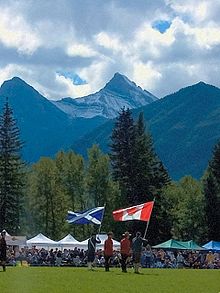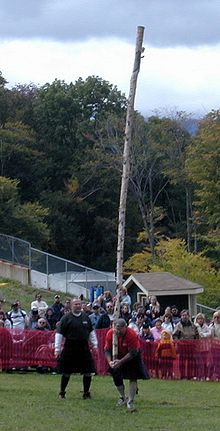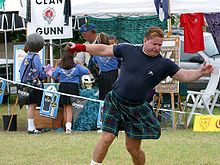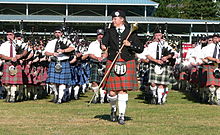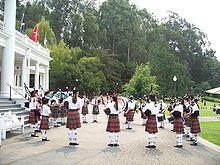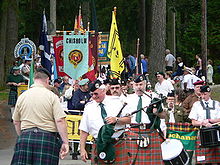- Highland games
-
Highland games are events held throughout the year in Scotland and other countries as a way of celebrating Scottish and Celtic culture and heritage, especially that of the Scottish Highlands. Certain aspects of the games are so well known as to have become emblematic of Scotland, such as the bagpipes, the kilt, and the heavy events, especially the caber toss. While centred on competitions in piping and drumming, dancing, and Scottish heavy athletics, the games also include entertainment and exhibits related to other aspects of Scottish and Gaelic culture.
The Cowal Highland Gathering, better known as the Cowal Games, held in Dunoon, Scotland, every August, is the largest Highland games in Scotland, attracting around 3,500 competitors and somewhere in the region of 15–20,000 spectators from around the globe. Worldwide, however, it is dwarfed by two gatherings in the United States: the 50,000 that attend Grandfather Mountain in North Carolina and the even larger gathering—the largest in the Northern Hemisphere—that has taken place every year since 1865 hosted by the Caledonian Club of San Francisco. This event is currently held Labor Day weekend in Pleasanton, California.[1]
The games are claimed to have influenced Baron Pierre de Coubertin when he was planning the revival of the Olympic Games. De Coubertin saw a display of Highland games at the Paris Exhibition of 1889.[1]
Contents
History
The origin of human games and sports predates recorded history. An example of a possible early games venue is at Fetteresso, although that location is technically a few miles south of the Scottish Highlands.
It is reported in numerous books and Highland games programs, that King Malcolm III of Scotland, in the 11th century, summoned contestants to a foot race to the summit of Craig Choinnich (overlooking Braemar).[2] King Malcolm created this foot race in order to find the fastest runner in the land to be his royal messenger. Some have seen this apocryphal event to be the origin of today's modern Highland games.[3]
There is a document from 1703 summoning the clan of the Laird of Grant, Clan Grant. They were to arrive wearing Highland coats and "also with gun, sword, pistill [sic] and dirk".[4] From this letter, it is believed that the competitions would have included feats of arms.
However, the modern Highland games are largely a Victorian invention, developed after the Highland Clearances.
Events
Heavy Events
In their original form many centuries ago, Highland games revolved around athletic and sports competitions. Though other activities were always a part of the festivities, many today still consider Highland athletics to be what the games are all about — in short, that the athletics are the Games, and all the other activities are just entertainment. Regardless, it remains true today that the athletic competitions are at least an integral part of the events and one — the caber toss — has come to almost symbolize the Highland games.
Although quite a range of events can be a part of the Highland athletics competition, a few have become standard.
- Caber toss: A long tapered pine pole or log is stood upright and hoisted by the competitor who balances it vertically holding the smaller end in his hands (see photo). Then the competitor runs forward attempting to toss it in such a way that it turns end over end with the upper (larger) end striking the ground first. The smaller end that was originally held by the athlete then hits the ground in the 12 o'clock position measured relative to the direction of the run. If successful, the athlete is said to have turned the caber. Cabers vary greatly in length, weight, taper, and balance, all of which affect the degree of difficulty in making a successful toss. Competitors are judged on how closely their throws approximate the ideal 12 o'clock toss on an imaginary clock.
- Stone put: This event is similar to the modern-day shot put as seen in the Olympic Games. Instead of a steel shot, a large stone of variable weight is often used. There are also some differences from the Olympic shot put in allowable techniques. There are two versions of the stone toss events, differing in allowable technique. The "Braemar Stone" uses a 20–26 lb stone for men (13–18 lb for women) and does not allow any run up to the toeboard or "trig" to deliver the stone, i.e., it is a standing put. In the "Open Stone" using a 16–22 lb stone for men (or 8–12 lb for women), the thrower is allowed to use any throwing style so long as the stone is put with one hand with the stone resting cradled in the neck until the moment of release. Most athletes in the open stone event use either the "glide" or the "spin" techniques.
- Scottish hammer throw: This event is similar to the hammer throw as seen in modern-day track and field competitions, though with some differences. In the Scottish event, a round metal ball (weighing 16 or 22 lb for men or 12 or 16 lb for women) is attached to the end of a shaft about 4 feet in length and made out of wood, bamboo, rattan, or plastic. With the feet in a fixed position, the hammer is whirled about one's head and thrown for distance over the shoulder. Hammer throwers sometimes employ specially designed footwear with flat blades to dig into the turf to maintain their balance and resist the centrifugal forces of the implement as it is whirled about the head. This substantially increases the distance attainable in the throw.
- Weight throw, also known as the weight for distance event. There are actually two separate events, one using a light (28 lb for men and 14 lb for women) and the other a heavy (56 lb for men, 42 lb for masters men, and 28 lb for women) weight. The weights are made of metal and have a handle attached either directly or by means of a chain. The implement is thrown using one hand only, but otherwise using any technique. Usually a spinning technique is employed. The longest throw wins.
- Weight over the bar, also known as weight for height. The athletes attempt to toss a 56 pound (4 stone) weight with an attached handle over a horizontal bar using only one hand. Each athlete is allowed three attempts at each height. Successful clearance of the height allows the athlete to advance into the next round at a greater height. The competition is determined by the highest successful toss with fewest misses being used to break tie scores.
- Sheaf toss: A bundle of straw (the sheaf) weighing 20 pounds (9 kg) for the men and 10 pounds (4.5 kg) for the women and wrapped in a burlap bag is tossed vertically with a pitchfork over a raised bar much like that used in pole vaulting. The progression and scoring of this event is similar to the Weight Over The Bar. There is significant debate among athletes as to whether the sheaf toss is in fact an authentic Highland event. Some argue it is actually a country fair event, but all agree that it is a great crowd pleaser.
- Maide Leisg(Scots Gaelic meaning 'Lazy Stick'): Trial of strength performed by two men sitting on the ground with the soles of their feet pressing against each other. Thus seated, they held a stick between their toes which they pulled against each other till one of them was raised from the ground. The oldest 'Maide Leisg' competition in the world takes place at the Carloway show and Highland Games on the Isle of Lewis.
Many of the Heavy Events competitors in Scottish highland athletics are former high school and college track and field athletes who find the Scottish games are a good way to continue their competitive careers.
Increasingly in the USA, the Heavy Events are attracting women and master class athletes which has led to a proliferation of additional classes in Heavy Events competitions. Lighter implements are used in the classes.
Music
For many Highland games festival attendees, the most memorable of all the events at the games is the massing of the pipe bands. Normally held in conjunction with the opening and closing ceremonies of the games, as many as 20 or more pipe bands will march and play together. The result is a thunderous rendition of traditional favourites Scotland the Brave or Amazing Grace, and other crowd-pleasing favorites.
It is, in fact, the music of the bagpipe which has come to symbolise music at the Games and, indeed, in Scotland itself. In addition to the massed bands, nearly all Highland games gatherings feature a wide range of piping and drumming competition, including solo piping and drumming, small group ensembles and, of course, the pipe bands themselves.
But the pipes and drums are not the only music which can be heard at Highland games. Music at Highland games gatherings takes on a variety of forms. Many such events offer fiddling, harp circles, Celtic bands and other forms of musical entertainment, the latter usually spiced with a healthy amount of bagpipe music.
Dance
Cowal Highland Games hosts the annual World Championship Highland Dancing Competition. This event gathers the best competitive dancers from around the world who compete for the World Championship Title.
Secondary events and attractions
At modern-day Highland Games events, a wide variety of other activities and events are generally available. Foremost among these are the clan tents and vendors of Scottish related goods. The various clan societies make the Highland games one of the main focus of their seasonal activities, usually making an appearance at as many such events as possible. Visitors can find out information about the Scottish roots and can become active in their own clan society if they wish.
At modern games, armouries will display their collections of swords and armour, and often perform mock battles. Various vendors selling Scottish memorabilia are also present selling everything from Irn-Bru to the stuffed likeness of the Loch Ness Monster.
Herding dog trials and exhibitions are often held, showcasing the breeder's and trainer's skills. In addition, there may be other types of Highland animals present, such as the Highland cattle.
Various traditional and modern Celtic arts are often showcased. This could include Harper's circles, Scottish country dancing, and one or more entertainment stages. In addition, most events usually feature a pre-event ceilidh (a type of social event with traditional music, dancing, song, and other forms of entertainment).
Various food vendors will also offer assorted types of traditional Scottish refreshment and sustenance.
Major events in Scotland
Location Name Details Braemar, Aberdeenshire Braemar Gathering Attended by the British Royal Family. Burntisland, Fife Burntisland Highland Games Second oldest in the world Ceres, Fife CERES HIGHLAND GAMES Oldest Free games in the world Crieff Crieff Highland Games Dunoon Cowal Highland Gathering Biggest Games in Scotland Inverkeithing Inverkeithing Highland Games Halkirk Halkirk Highland Games started in 1886, Lochearnhead Balquhidder, Lochearnhead & Strathyre Highland Games Cameron's, MacLaren and MacGregor clans linked to the games Pitlochry Pitlochry Highland GamesIsle Of Skye Highland Games Portree Isle Of Skye Highland Games St. Andrews St. Andrews Highland Games Major events outside Scotland
Canada
Location[2] Name Calgary, Alberta Calgary Highland Games Cambridge, Ontario Cambridge Highland Games Grande Prairie, Alberta Grande Prairie Highland Games Coquitlam, British Columbia BC Highland Games Victoria, British Columbia Victoria Highland Games and Celtic Festival Antigonish, Nova Scotia Antigonish Highland Games Almonte, Ontario North Lanark Highland Games Cobourg, Ontario Cobourg Highland Games Fergus, Ontario Fergus Scottish Festival and Highland Games Maxville, Ontario Glengarry Highland Games Sudbury, Ontario Sudbury Celtic Festival & Highland Games Montreal, Quebec Montreal Highland Games Switzerland
Location Name St. Ursen, Fribourg Highland Games Swiss Championships United States
Location[2] Name Scottsboro, Alabama North Alabama Scottish Festival & Highland Games Eagle River, Alaska Alaskan Scottish Highland Games Camp Verde, Arizona Verde Valley Highland Games Phoenix, Arizona Arizona Scottish Gathering and Highland Games Prescott, Arizona Prescott Highland Games Tucson, Arizona Tucson Celtic Festival and Highland Games Batesville, Arkansas Arkansas Scottish Festival Bakersfield, California Bakersfield High Games Santa Cruz County, California Scottish Renaissance Festival featuring the Loch Lomond Highland Games & Celtic Gathering Campbell, California Campbell Highland Games Costa Mesa, California United Scottish Highland Gathering Fresno, California Fresno Highland Games Livermore, California Livermore Scottish Games and Celtic Celebration Modesto, California Modesto Highland Games Oakland, California Oakland Scottish Games Pleasanton, California Caledonian Club of San Francisco Highland Gathering Salinas, California Monterey Highland Games and Celtic Festival Santa Cruz, California Santa Cruz Highland Games and Celtic Festival Ventura, California Seaside Highland Games Vista, California San Diego Scottish Highland Games and Gathering Woodland, California Sacramento Valley Scottish Games Elizabeth, Colorado Elizabeth Celtic Festival Estes Park, Colorado Long's Peak Scottish/Irish Highland Festival Highlands Ranch, Colorado Colorado Scottish Festival Sterling, Colorado Sterling Celtic Festival Goshen, Connecticut St. Andrews Society of Connecticut Scottish Festival Norwalk, Connecticut Round Hill Highland Games Scotland, Connecticut Scotland Highland Festival Dunedin, Florida Dunedin Highland Games Fort Lauderdale, Florida Southeast Florida Scottish Festival and Games Green Cove Springs, Florida Northeast Florida Scottish Highland Games Ocala, Florida Ocala Scottish Highland Games and Celtic Festival Panama City, Florida Panama City Highland Games Pensacola, Florida Pensacola Highland Games Tallahassee, Florida Tallahassee Highland Games Sarasota, Florida Sarasota Highland Games Winter Springs, Florida Central Florida Scottish Highland Games Zephyrhills, Florida Zephyrhills Celtic Festival and Highland Games Blairsville, Georgia Blairsville Scottish Festival and Highland Games Chickamauga, Georgia Appalachian Celtic Festival Anderson, South Carolina Loch Hartwell Highland Games Ringgold, Georgia Ringold Highland Games Savannah, Georgia Savannah Scottish Games and Highland Festival Stone Mountain, Georgia Stone Mountain Highland Games Honolulu, Hawaii Hawaiian Scottish Festival Boise, Idaho Treasure Valley Highland Games Oakbrook, Illinois Illinois St. Andrew Society Highland Games Springfield, Illinois Shamrock Games Springfield, Illinois Springfield Highland Games and Celtic Festival Columbus, Indiana Columbus, Indiana Scottish Festival Fort Wayne, Indiana Indiana Highland Games South Bend, Indiana Celtic Festival and Bryan Verkler Invitational Highland Games Davenport, Iowa Celtic Festival and Highland Games of the Quad-Cities McPherson, Kansas McPherson Scottish Festival and Highland Games Wakeeney, Kansas Th' Gatherin' Fire Festival O'Beltane Carrollton, Kentucky Kentucky Scottish Weekend Glasgow, Kentucky Glasgow Highland Games Murray, Kentucky Western Kentucky Highlands Festival Jackson, Louisiana Highland Games of Louisiana Minden, Louisiana Tartan Day Celebration West Monroe, Louisiana Northeast Louisiana Celtic Festival Belfast, Maine Maine Celtic Celebration Brunswick, Maine Maine Highland Games Elkton, Maryland Fair Hill Scottish Games Frederick, Maryland Frederick Celtic Festival Havre De Grace, Maryland Stepping Stone Museum Highland Games St. Leonard, Maryland Southern Maryland Celtic Festival and Highland Gathering McHenry, Maryland McHenry Higland Festival Snow Hill, Maryland Chesapeake Celtic Festival Florence, Massachusetts Glasgow Lands Scottish Festival www.glasgowlands.org Greenfield, Massachusetts Western Massachusetts Highland Games and Festival Alma, Michigan Alma Highland Festival and Games Kalamazoo, Michigan Kalamazoo Highland Games Livonia, Michigan St. Andrews Society of Detroit Highland Games Saline, Michigan Saline Highland Games Farmington, Minnesota Minnesota Scottish Fair Moorhead, Minnesota Celtic Festival Gulfport, Mississippi Highlands and Islands Games on the Gulf Coast Jackson, Mississippi Celtic Fest Mississippi Buffalo, Missouri Southwest Missouri Celtic Heritage Festival Riverside, Missouri Kansas City Highland Games St. Charles, Missouri Missouri Tartan Day Festivities www.motartanday.com Hamilton, Montana Bitterroot Scottish Irish Festival Las Vegas, Nevada Las Vegas Celtic Gathering Reno, Nevada Reno Celtic Celebration Lincoln, New Hampshire New Hampshire Highland Games www.nhscot.org Albuquerque, New Mexico Rio Grande Valley Celtic Festival and Highland Games Altamont, New York Capital District Scottish Games Amherst, New York Amherst Museum Scottish Festival and Highland Games Old Westbury, New York Long Island Scottish Games Greensboro, North Carolina Triad Highland Games Hendersonville, North Carolina Foothills Highland Games and Festival Huntersville, North Carolina Loch Norman Highland Games Laurinburg, North Carolina Scotland County Highland Games Linville, North Carolina Grandfather Mountain Highland Games Mint Hill, North Carolina Mint Hill Highland Games Waxhaw, North Carolina Waxhaw Scottish Highland Games Winston-Salem, North Carolina Winston-Salem Celtic Music Festival and Highland Games Hartville, Ohio Brigadoon Beltane Festival Wellington, Ohio Ohio Scottish Festival Tulsa, Oklahoma Oklahoma Scottish Festival and Highland Games Yukon, Oklahoma Scottish Heritage Festival and Highland Games Athena, Oregon Athena Caledonian Games Baker City, Oregon Eastern Oregon Highland Games Gresham, Oregon Portland Highland Games Madras, Oregon High Desert Celtic Festival and Games Winston, Oregon Douglas County Celtic Highland Games Bethlehem, Pennsylvania Bethlehem Celtic Classic Edinboro, Pennsylvania Edinboro Highland Games Ligonier, Pennsylvania Ligonier Highland Games Manheim, Pennsylvania Celtic Fling and Highland Games Richmond, Rhode Island Rhode Island Scottish Highland Festival Clover, South Carolina Clover Scottish Games Greenville, South Carolina Greenville Scottish Highland Games Mt. Pleasant, South Carolina Charleston Scottish Games and Highland Gathering Rapid City, South Dakota Black Hills Dakota Gathering of the Clans Elizabethton, Tennessee Sycamore Shoals Celtic Festival Gatlinburg, Tennessee Gatlinburg Scottish Highland Games Jackson, Tennessee Celtic Fest Arlington, Texas Texas Scottish Festival and Highland Games Bedford, Texas Bedford Celtic Heritage Festival Helotes, Texas San Antonio Highland Games Houston, Texas Houston Highland Games and Celtic Festival Salado, Texas Salado Scottish Clan Gathering and Highland Games Lehi, Utah Utah Highland Games Payson, Utah Payson Scottish Festival Delaplane, Virginia Virginia Scottish Games and Festival Leesburg, Virginia Potomac Celtic Festival Lanexa, Virginia Williamsburg Scottish Festival Lexington, Virginia Lexington Scots Irish Festival Mechanicsville, Virginia Meadow Highland Games and Celtic Festival Radford, Virginia Radford Highlander Festival Enumclaw, Washington Pacific Northwest Scottish Highland Games Bellingham, Washington Bellingham Highland Games Graham, Washington Tacoma Highland Games Greenbank, Washington Whidbey Island Highland Games Kelso, Washington Kelso Hilander Festival and Games Mount Vernon, Washington Skagit Valley Highland Games and Celtic Festival Prosser, Washington Prosser Scottish Festival Puyallup, Washington Scottish American Festival Spokane, Washington Spokane Highland Games Bridgeport, West Virginia North Central West Virginia Scottish Festival and Celtic Gathering Milwaukee, Wisconsin Milwaukee Highland Games and Festival Waukesha, Wisconsin Wisconsin Highland Games Gillette, Wyoming Wyoming Celtic Festival Jackson, Wyoming Jackson Hole Scottish Festival Notes
- ^ e at VisitScotland.com
- ^ For a modern day fictional account of this event, see The origins of the Braemar Games Hill Race, by Les Wheeler
- ^ The interested reader can consult any number of Highland games web sites, many of which contain a brief sketch on the history of the Highland games themselves. Most will mention this hill climb, some referring to it as a story or legend, others as if it were an established fact and going from there to state just as matter-of-factly that the Highland games as we know them today can be traced back to or owe their origins to this hill climb event. As just one example (among many), the program (and web site) of the Pacific Northwest Highland Games states: "One of the first Highland games was held towards the end of the eleventh century, when King Malcolm Canmore . . ." going on from there to recount the story of the hill climb. Webster, in Scottish Highland Games, is not so certain. He recounts the story, labelling it as story, or legend only. Thomas Owen Clancy and Barbara E. Crawford, in the Bibliographical essay to chapter 2 (The Formation of the Scottish Kingdom) of The New Penguin History of Scotland state: "Little of significance has been written about the eleventh century kingdom otherwise, except on the dispute over the reliability of the early documentary sources. . .".
- ^ As quoted on the history page of the Aboyne Highland Gathering web site
- ^ The web site of the International Wrestling Association reports rather more expansively on the role of the 1889 Paris event and its effect on the development of the Olympics, considering it to have had a "huge impact" on world sport. An article published in 2004 in the Christian Science Monitor points to two other events, including that of Much Wenlock, a small English village in Shropshire,
See also
- The Gathering 2009
- Highland games competitors
- Sport in Scotland
- Fergus Highland Games
- World Highland Games Championships
References
- ^ Horne, Marc (25 April 2010). "Highland games were the model for modern Olympics". London: The Times. http://www.timesonline.co.uk/tol/news/uk/scotland/article7107301.ece. Retrieved 3 May 2010.
- ^ a b "Calendar of Highland Games and Scottish Events in North America". Clan Campbell Society. http://www.ccsna.org/games/state_province.html. Retrieved 21 February 2010.
Bibliography
- Michael Brander, Essential Guide to the Highland Games (1992) ISBN 0-86241-302-8
- Emily Ann Donaldson, The Scottish Highland Games in America (Pelican Publishing Company, Gretna, LA, 1986). ISBN0-88289-474-9.
- Joan F. Flett and Thomas M. Flett, Traditional Dancing in Scotland (London: Routledge & Kegan Paul 1964, 1985), ISBN 0-7102-0731-X
- John G. Gibson, Traditional Gaelic Bagpiping, 1745-1945 (McGill-Queen's University Press, Montreal, 1998). ISBN 0-7735-1541-0. See esp. chapter 15, "Highland Games and Competition Piping"
- Ian R. Mitchell, "Rheumatism, Romanticism and Revolution: Victoria, Balmorality and 1848" in History Scotland (Vol. 5, #5, Sept/Oct 2005)
- John Prebble, The King's Jaunt (Edinburgh: Birlinn Ltd,1988., 2000), ISBN 1-84158-068-6
- Hugh Trevor-Roper, "The Invention of Tradition: The Highland Tradition of Scotland." in The Invention of Tradition ed. Eric Hobsbawm and Terence Ranger. Cambridge: Cambridge University Press, 1983, ISBN 0-521-24645-8.
- David Webster, Scottish Highland Games (Edinburgh, Scotland 1973)
External links
- The Scottish Highland Games Association
- Official Scottish Tourist Board Highland Games Calendar
- COSCA Council of Scottish Clans and Associations
- Highland Games FAQ: What to know before you go
- US Scots: includes extensive listing of Highland games events
- Tulloch Inverness Highland Games - Masters World Championships
- The Official Highland Games Swiss Championships
 Scotland topics
Scotland topicsHistory Geography Geology · Climate · Demographics · Mountains and hills · Islands · Lochs · Waterfalls · Fauna · Flora · Highlands · Lowlands · Central Belt · Anglo-Scottish borderEconomy Companies · Bank of Scotland · Royal Bank of Scotland · North Sea oil · Whisky · Tourism · Harris Tweed · Renewable energy · Transport · Saltire FoundationLaw People Politics Religion Languages Culture Clans · Cuisine · Education · Flags · Coat of arms · Anthem · Hogmanay · Innovations · Literature · Music · Sport · World Heritage Sites · National identity · National symbols · Scottish surnames Category ·
Category ·  Portal ·
Portal ·  WikiProject
WikiProjectScottish clans Clans with chiefs Agnew · Anstruther · Arbuthnott · Arthur · Bannerman · Barclay · Borthwick · Boyd · Boyle · Brodie · Broun · Bruce · Buchan · Burnett · Cameron · Campbell · Carmichael · Carnegie · Cathcart · Charteris · Chattan · Chisholm · Cochrane · Colquhoun · Colville · Cranstoun · Crichton · Cumming · Darroch · Davidson · Dewar · Drummond · Dunbar · Dundas · Durie · Elliot · Elphinstone · Erskine · Farquharson · Fergusson · Forbes · Forsyth · Fraser · Fraser of Lovat · Gayre · Gordon · Graham · Grant · Gregor · Grierson · Guthrie · Haig · Haldane · Hamilton · Hannay · Hay · Henderson · Home · Hope · Hunter · Irvine · Jardine · Johnstone · Keith · Kennedy · Kerr · Kincaid · Lamont · Leask · Lennox · Leslie · Lindsay · Lockhart · Lumsden · Lyon · MacAlister · MacBain · MacDonald · Macdonald of Clanranald · MacDonald of Keppoch · Macdonald of Sleat · MacDonell of Glengarry · MacDougall · Macdowall · MacIntyre · Mackay · Mackenzie · Mackinnon · Mackintosh · Maclachlan · Maclaine of Lochbuie · MacLaren · MacLea (Livingstone) · Maclean · MacLennan · MacLeod · MacLeod of Lewis · MacMillan · Macnab · Macnaghten · MacNeacail · MacNeil · Macpherson · MacTavish · MacThomas · Maitland · Makgill · Malcolm (MacCallum) · Mar · Marjoribanks · Matheson · Menzies · Moffat · Moncreiffe · Montgomery · Morrison · Munro · Murray · Napier · Nesbitt · Nicolson · Ogilvy · Oliphant · Primrose · Ramsay · Rattray · Riddell · Robertson · Rollo · Rose · Ross · Ruthven · Sandilands · Scott · Scrymgeour · Sempill · Shaw · Sinclair · Skene · Spens · Stirling · Strange · Stuart of Bute · Sutherland · Swinton · Trotter · Urquhart · Wallace · Wedderburn · Wemyss · Wood ·
Armigerous clans Abercromby · Abernethy · Adair · Adam · Aikenhead · Ainslie · Aiton · Allardice · Anderson · Armstrong · Arnott · Auchinleck · Baillie · Baird · Balfour · Bannatyne · Baxter · Bell · Belshes · Bethune · Beveridge · Binning · Bissett · Blackadder · Blackstock · Blair · Blane · Blyth · Boswell · Brisbane · Buchanan · Butter · Byres · Cairns · Calder · Caldwell · Callender · Campbell of Breadalbane · Campbell of Cawdor · Carruthers · Cheyne · Chalmers · Clelland · Clephane · Cockburn · Congilton · Craig · Crawford · Crosbie · Cunningham · Dalmahoy · Dalrymple · Dalzell · Dennistoun · Don · Douglas · Duncan · Dunlop · Edmonstone · Fairlie · Falconer · Fenton · Fleming · Fletcher · Forrester · Fotheringham · Fullarton · Galbraith · Galloway · Gardyne · Gartshore · Ged · Gibsone · Gladstains · Glas · Glen · Glendinning · Gray · Gunn · Haliburton · Halkerston · Halket · Hepburn · Heron · Herries · Hogg · Hopkirk · Horsburgh · Houston · Hutton · Inglis · Innes · Kelly · Kinloch · Kinnaird · Kinnear · Kinninmont · Kirkcaldy · Kirkpatrick · Laing · Lammie · Langlands · Learmonth · Little · Logan · Logie · Lundin · Lyle · MacAulay · Macbrayne · MacDuff · MacEwen · MacFarlane · Macfie · Macgillivray · MacInnes · MacIver · Mackie · MacLellan · Macquarrie · Macqueen · Macrae · Masterton · Maule · Maxton · Maxwell · McCorquodale · McCulloch · McKerrell · Meldrum · Melville · Mercer · Middleton · Moncur · Monteith · Monypenny · Mouat · Moubray · Mow · Muir · Murray of Atholl · Nairn · Nevoy · Newlands · Newton · Norvel · Ochterlony · Orrock · Paisley · Paterson · Pennycook · Pentland · Peter · Pitblado · Pitcairn · Pollock · Polwarth · Porterfield · Preston · Pringle · Purves · Rait · Ralston · Renton · Roberton · Rossie · Russell · Rutherford · Schaw · Seton · Skirving · Somerville · Spalding · Spottiswood · Stewart · Stewart of Appin · Strachan · Straiton · Strange · Sydserf · Symmers · Tailyour · Tait · Tennant · Troup · Turnbull · Tweedie · Udny · Vans · Walkinshaw · Wardlaw · Watson · Wauchope · Weir · Whitefoord · Whitelaw · Wishart · Young
Culture and society Scotland · Clan chief · Septs · Clan badge · Clan crest · Clan battles · Tartan · Bagpipes · Clearances · Kilt · Manrent · The Highlands · Battle of Culloden · Highland games · Border Reivers · Scottish heraldry · Scottish surnames
Categories:- Highland games
- Multi-sport events
- Strongmen competitions
Wikimedia Foundation. 2010.

